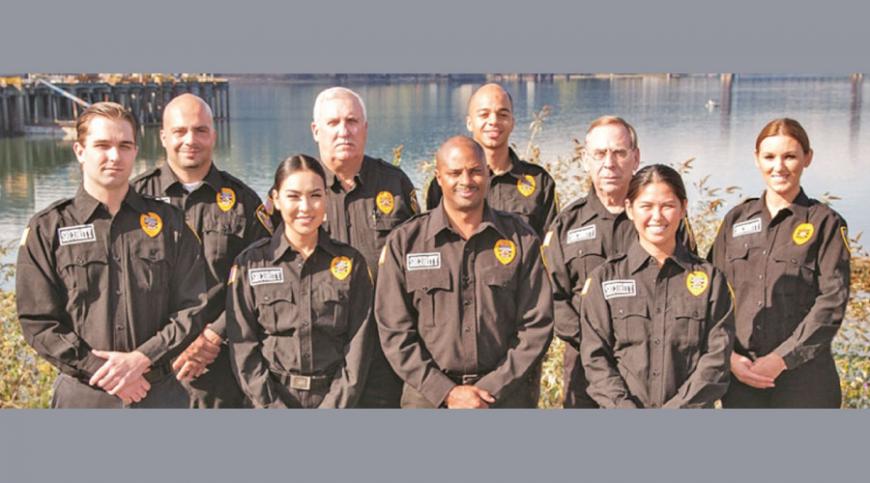
It was in 1956 that two enterprising school leavers, Fuard Uduman and Newton Dassanayake, started the Pettah Watchmen Service, as the first private security service in Sri Lanka. In his memoirs Dassanayake recalls: “Two guards clad in khaki coats, armed with torches, batons and whistles covered Second Cross Street, Pettah, on May 15, 1956.”
The industry has experienced a rapid growth during the last six decades. When it began to shift from the unorganised to the organised sector, the Government passed the Regulation of Private Security Agencies Act No. 45 of 1998, to regulate and control the carrying on of the business of private security agencies.
Now, 20 years later the industry is facing a number of challenges, some of which need urgent attention.
Challenges
At present the private security industry in Sri Lanka faces five main challenges, namely:
1) Lack of quality manpower: The modern private security job profile requires an adequate knowledge of multitasking and technology to perform security and safety functions. Skills development is a key issue here.Therefore, investment in human capital is vital in preparing this industry to take on greater responsibilities.
2) High Attrition: The main causes in weakening the private security industry are, poor benefits, lack of compensation packages, no proper insurance policies and development opportunity.
3) Minimal use of technology:The private security industry is manpower intensive. Due to lack of skilled manpower, most agencies recruit sub-standard people to meet the basic demand of guarding entrances and exits. Many private security agencies do not use technology due to high investments for training and gadgets.
4) Duty Hours:A clause in the labour Act specifies the number of duty hours per day and the maximum overtime hours of work permitted per day. But in some private security agencies, security personnel work more than the specified hours per day and without any specifications on overtime work..
5) Leave entitlement:The benefits of various leave entitlement categories are not extended to private security personnel.
Supply and demand
If the industry wishes to sustain its growth momentum, it has to entice quality manpower to join them. According to the Sri Lanka Labour Demand Survey 2017 issued by the Department of Census and Statistics, other than sewing machine operators, the most difficult-to-fill occupation in the formal sector was security guards. There were 45,316 vacancies.
The right type of people are not interested in joining the private security force due to many reasons. First, private security guards are paid less.
According to the Wages Board Ordinance, the starting salary of a security guard is Rs. 12,500 with Rs 100 yearly increments. Second, the benefits offered are poor. Duty hours are more than that specified, while leave entitlement practically does not exist.
Hence, the supply is less than the demand as the prevailing conditions make it difficult to attract and retain personnel.
The standard of education according to the Private Security Agencies Act No 45 of 1998 is 5th standard. No one can even be an office peon with 5th standard education. It needs to be revised to at least GCE O/L.
The regulatory framework governing this industry needs proper enforcement. This segment has remained unchecked and players usually skip adhering to mandatory regulations. It is imperative therefore, for the relevant authorities to ensure strict enforcement of the regulations in order to improve service delivery quality and work environment for the security personnel.
Overcoming challenges
The following are a few suggestions to overcome challenges:
1) Modern training: There is a need for specialized security academies to provide training, which needs to be made mandatory because of the advancement of technology and growing terror threats.
In the United Kingdom for example, the Security Industry Authority (SIA) is the organisation responsible for regulating the private security industry.
They are an independent body reporting to the Home Secretary, under the terms of the Private Security Industry Act 2001.
One of their main duties is the compulsory licensing of individuals undertaking designated activities within the private security industry. SIA licensing covers manned guarding (including security guarding, door supervision, close protection, cash and valuables in transit, and public space surveillance using CCTV), key holding and vehicle immobilising. Licensing ensures that private security operatives are ‘fit and proper’ persons, properly trained and qualified to do their job.We need to take a lesson from the UK.
2) Fixed Set of Standards: The industry needs to set fixed policies on insurance of security personnel, proper compensation packages and decent and competitive facilities.
3) Use of latest technology: The industry is lagging behind in the use of latest technology as compared to their counterparts in developing countries.
4) Amendment of Private Security Agencies Act No. 45 of 1998. This Act was passed twenty years ago, and needs to be amended according to the fast-changing scenario in the modern security industry.
Public-private partnerships – hybrid policing
It has been suggested that the private security industry could assist the police by performing a complementary patrol service. The Government must seriously consider this and encourage a constructive debate in this area.
In some European countries the police share patrolling and investigations with private security agencies. The police can also seek assistance from private security agencies for carrying out overhead services such as speed control on highways, traffic management, etc.
It is time the Government takes a fresh look and re-examine the importance of the private sector security industry.
A correct reformation would lead to a more competent and professional workforce and improve the public image of the private security industry in the country.
